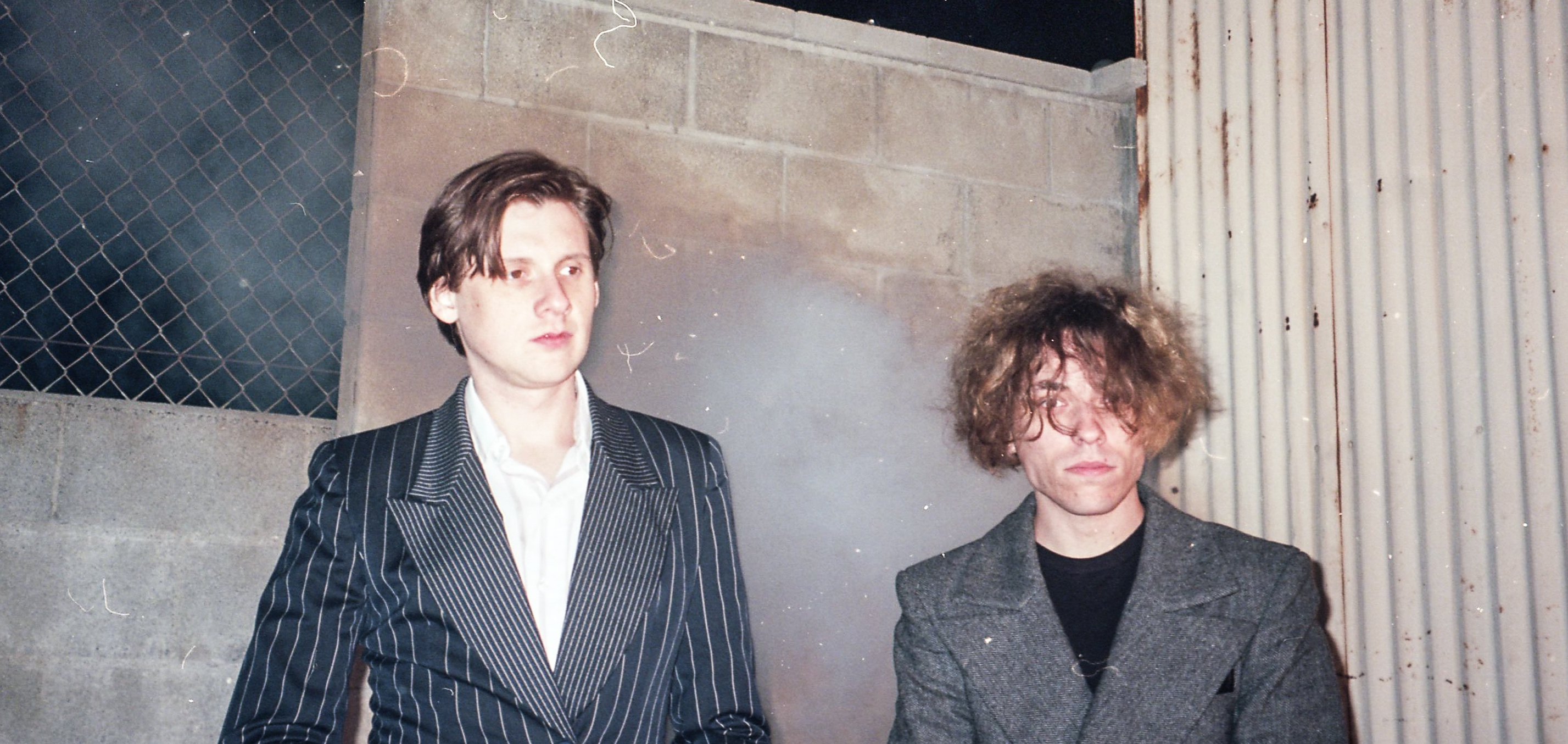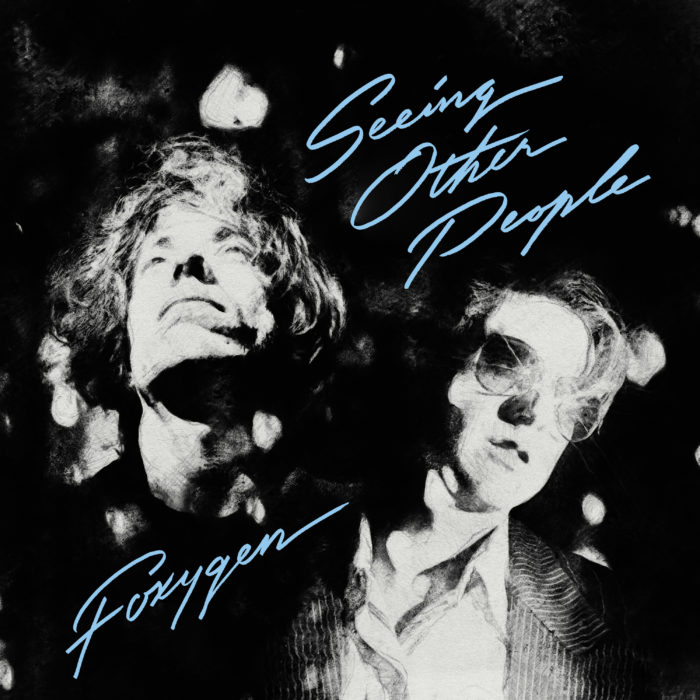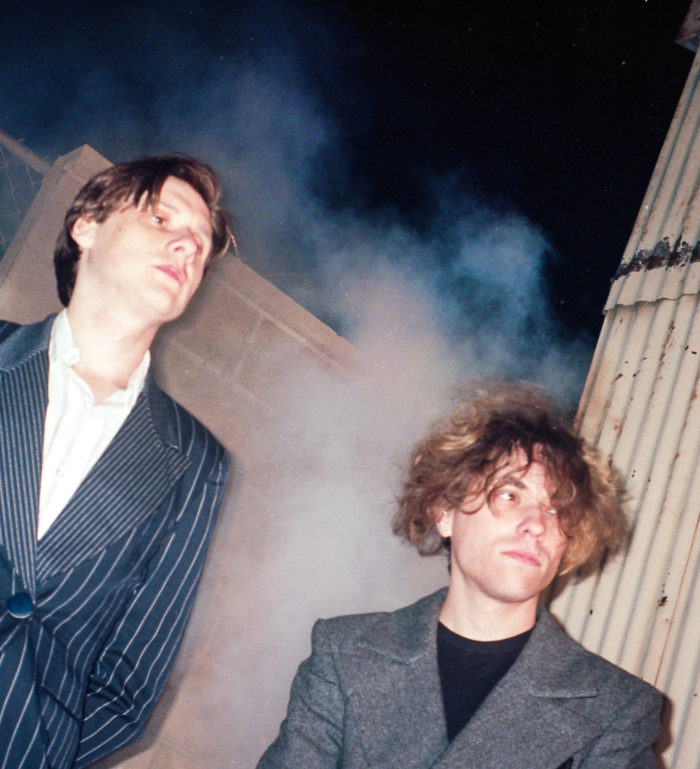Foxygen: Face the Facts

photo by Nicky Giraffe
With their streamlined and soulful fifth album, Seeing Other People, Foxygen may have finally achieved the wider mainstream appeal they’re not sure they really want.
“I’m going to make a boring solo album,” says Foxygen’s Sam France. “I’m writing a bunch of boring music, just to try that out.” His tone sounds sarcastic, but his frustrations—with music journalists, with the band’s management, with the financial and physical restraints of life as a touring indie band—are clearly genuine.
Foxygen, his recording partnership with Jonathan Rado, has earned just about every descriptor but “boring” over the past 12 years. Beginning with their early lo-fi experiment, 2007’s Jurrassic Exxplosion Philippic (recorded when both musicians were still 15) and continuing through a series of dizzying LPs, they’ve ventured into psychedelia, chamber-pop, folk and gritty glam-rock, but the duo never quite found the crossover success of kindred spirits MGMT or avant-garde heroes The Flaming Lips, though critics often applauded their experimentation. From the moment they dropped their 2013 crossover, the Richard Swift-produced We Are the 21st Century Ambassadors of Peace & Magic, it remained difficult to tell if the duo were mocking rock-star clichés, living them or simply punking anyone who tried to discern the difference between the multidimensional characters in their songs and the real-life stories unfolding onstage.
With their more streamlined and soulful new album, Seeing Other People, they may have finally punched a ticket to wider mainstream appeal. There are hooks aplenty: the clanging, warped pop of “Work;” the woozy lounge balladry of the title track; the string-fueled funk of “Face the Facts.” But it’s too late—France is already disinterested.
“I just wanted to make some money,” he says, bluntly, of the record’s more scaled-back approach. “I wanted to have some songs that would make me some money or that we could tour on, but then I decided I didn’t want to tour anyway. I made the album that should have been really toured and promoted—the album that could have made us a crossover band. Then I decided, ‘Fuck it; I don’t want to do that.’”
Fittingly, Seeing Other People arrives a few years after Foxygen’s most ambitious LP, 2017’s Hang—a sonic maze of orchestral indulgence, soft-rock crooning, smooth-jazz guitar solos and what could pass for proggy Broadway musical numbers, among other surprises. Replicating such a carnivalesque project onstage would have likely bankrupted the band. However, they could pull off their latest with the help of a couple friends, no sweat.
Seeing Other People doesn’t sound like a creative compromise, but it’s easy to trace France’s angst throughout the album which, as its title alludes, marks the end of a particular line—not for the band itself, but for their old way of doing things. At various points, France laments the end of relationships (the grooving “The Conclusion”), lashes out at an artistic copycat (“You’re ripping off my act and my show,” he sneers on “Livin’ a Lie”) and tells himself some hard truths. (“You’re never gonna be a famous rock and roller,” he sings on “Face the Facts.”)
“I was singing a lot about our career itself,” France says. “I wasn’t at the point a lot of people told me I would be when we started—all the bullshit that management and everyone tells you: ‘You’re gonna be huge.’ Just letting that dream die is a lot of what the record is about. We never became a mainstream band. We have no money. All the things that these greasy, fake-hipster bros told us, to promote all this stuff for them and do all this stuff for free—it was all lies. That’s a big theme of the record.”

Ironically, considering France’s disillusion with the music business, Foxygen expanded their collaborative circle even wider on Seeing Other People—enlisting mixer/engineer Shawn Everett (a four-time Grammy winner who’s worked with Weezer, The War on Drugs and Alabama Shakes), string player/arranger Rob Moose (whose sessions include everyone from John Legend to Bon Iver to Joshua Bell) and iconic session drummer Jim Keltner (best known for his work with George Harrison, John Lennon and Ringo Starr). And the material called for the fresh perspectives of outsiders.
“After the Hang album and tour, we were very sick of the 1970s,” Rado says. “We wanted to try to make something that wasn’t really influenced by a specific time period. I’d built a studio, so I got some drum machines and stuff. Sam was writing all these songs, and they all lent themselves to that style—that informed where the record went.”
Keltner, the album’s most revered guest, came onboard through a combo happy accident/Hail Mary pass. They originally reached out to drummer Andy Newmark (Sly & the Family Stone, David Bowie, Roxy Music), but he introduced them to Keltner after backing out due to travel constraints. “He lived like two minutes from my studio, so he’d drive down every day,” Rado says of Keltner. “He’s in his seventies, but he has more energy than I do. We’d record three songs, and it would be like 11 p.m., and he’d be like, ‘What’s next, guys?’ He was ready to go all night.”
The percussionist, perhaps an unlikely choice on paper, championed the band’s weirdest recording ideas—and even came up with a few of his own.
“He’s eternally young, and he loves toying around with stuff,” says Rado. “One day, he brought in this big shaker that Tom Waits had given him: He said, ‘Nobody will let me put it on their record. I think it would be great on your record.’ It was like the size of a 2×4, and he played it on ‘The Conclusion.’ He played the trash on ‘Work’—we found a bunch of trash in the back of the studio so, on that track, he’s playing drums but also garbage.”
As always, Foxygen were committed to their analog aesthetic, utilizing painstaking methods to avoid the convenience of modern recording technology. “We don’t really use the computer at all,” Rado says. “[Everett] is a wizard at Pro Tools, but he loves challenges being thrown his way, and I think he responded to the idea of only using tape. We’d run into these situations where we’d have to fly in some vocal or part that would take three seconds to do in Pro Tools.”
“The production on the album was absolutely nuts,” France adds. “Nothing could just be recorded. It had to be sampled onto MPC and then printed out, with the tape dragged behind a truck, and then triggered by a synth, sampled by another MPC. That’s why the album has that sound. There was a lot of sampling ourselves playing. There’s so much madness. It’s probably the most involved production we’ve ever done.”
The final step in the process, mastering, was also nuts—but for an unusual reason.
“The original riff of [‘The Thing Is’] was exactly the same as Bruce Springsteen’s ‘Glory Days,’” Rado says. “We didn’t even realize it. Sam just had that riff, and I was like, ‘Cool, that sounds familiar,’ but we didn’t know exactly what it was. We did the whole track with that riff and, at some point, we played it for our managers at the time, and they were like, ‘That’s ‘Glory Days.’’ We tried to run it by Springsteen and get it to his publishing, and we said we’d treat it as a sample. They were like, ‘No, thanks.’ [Laughs.] I had to go back in without Sam at the end and change the riff to whatever it is now.”

France isn’t sure whether the album’s hectic birth will yield a hit, but he admits they were “delusional” for ever expecting one in an indie scene that he deems monochromatic and enslaved to politeness. “The landscape is even less whimsical now, and everything is so watered down,” he says with a deep sigh. “Ideally, the band would have to be less interesting to be played at low volume in the back of a Brooklyn bar. My music is too provocative. There’s something about it. Talking in interviews lately, people keep saying it’s just a ‘divisive’ band. I don’t really know why. It’s not trendy right now. It’s trendy right now to be a long-haired dude with an acoustic guitar, and [be like], ‘Here’s a song about Bernie Sanders. My album is about this changing world—it’s serious and political. Here’s my boring voice—let me water it down for you.’ Unfortunately, that’s what a lot of the publications and blogs promote. That’s what they put on a pedestal—there’s this climate of fear in art where everyone’s trying to do the right thing, say the right thing. I don’t do that. I’m doing my own thing.”
As of now, his “own thing” includes the aforementioned “boring” solo album, an attempt to dilute his “normal formula” and see what happens. The idea comes off like a mixture of social commentary and a Producers-style move at dumbing down his music for mass appeal. Really, he just wants “to see what happens.”
“[I’ll] take aspects of what people like about me, take aspects of [We Are the 21st Century Ambassadors of Peace & Magic], but reduce them to a folk-rock style and promote it in a way that makes me seem really serious about this album,” he says. “Maybe it should be about a breakup or politics or something like that. Maybe it should be about the ‘changing world we live in today.’ Maybe it should be an anti-Trump album. Maybe that would be good—an anti-Trump acoustic album with slight psychedelic Foxygen vibes. Maybe that’s what I need to do. I don’t know.”
While the door for another Foxygen album remains open, it’s clear the duo have other projects in mind. Rado—who issued his debut solo LP, Law and Order, in 2013—has blossomed into a high-demand producer in recent years, working with Father John Misty, Houndmouth and Whitney. And France is trying to move further away from the corporate machine—looking for his own production and recording work, and offering music to fans directly through email. (He recently released a limited vinyl copy of two songs via his new Fascist Records label at a solo show.)
France wants to escape the mainstream, in part, because of how critics have often described his voice—and Foxygen as a whole.
“I can’t get rid of these fucking dumb, rotating Bowie/Lou Reed/Mick Jagger [comparisons],” he says. “No one ever says I’m a talented vocalist. Nobody ever says I’m a talented songwriter. Maybe they say they like the band. I’ve never read a review where anyone’s said, ‘He’s a really good songwriter. He’s a nuanced singer. He’s making really good, post-modern, groundbreaking music.’ No one ever wants to give that to me. It’s just too far.
“It’s hard for me to break out of this thing,” he continues. “It follows me around to this day. I’m basically in a prison of people’s perception, and that’s why I don’t want to do this anymore. It’s just unrewarding. I’ve never felt respected by the journalists. I’m trying to let people know that this whole music career is a prison.”
Rado shares some of that frustration, which he ties back to Foxygen’s arc as a whole.
“Our experience as Foxygen in the music industry has been hard because we’d been a recording band and had to try to make the live aspect of it [work],” he says. “We signed a record deal very young and didn’t really know what we were doing. We fell into the touring lifestyle, and it drove us a little crazy because we couldn’t play the songs live the way we wanted to. The only way we could do this would be to put together these bands that were a ton of people. We’d tour and make zero money. It’s never been easy for us financially, and I think that can lead to some resentment in the industry. It’s hard to sustain a band that has wild ambition when nobody really wants to give you the full credit… or something.
“I think people do write us off as a retro outfit and, obviously, that’s partially our own doing, and there are aspects of the band that are retro or whatever,” he continues. “But we never thought of it that way—we thought of it as Andy Warhol taking elements of the past and reinterpreting them in a modern way. I think people can easily write it off, and that’s hard to deal with for years and years. At some point, you get burned out and want to do something else. I don’t think Sam and I will ever stop recording music, but I don’t know what the future of Foxygen is as a live touring band.”
In the meantime, France’s inbox is open.
“I’ll work with anyone, really,” he says. “I don’t have any biases or complexes. If people are willing to pay, I’ll go wherever they want me to go and give my two cents on the record. I’m not an extremely—well, yeah, I am—a great producer and accomplished songwriter. I was writing charting records by age 21. I’ve done production work on all the Foxygen records. I’ve ghostwritten records for other people. I’ve sung on hundreds of records.
“I’m a performance artist,” he adds. “I’m an actor. I’ll do any type of entertainment work by the hour for anyone who needs it. I do it all.”
This article originally appears in the June 2019 issue of Relix. For more features, interviews, album reviews and more, subscribe here.



















